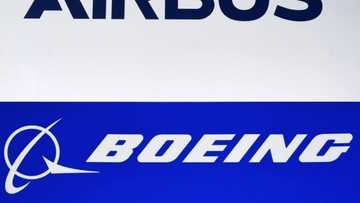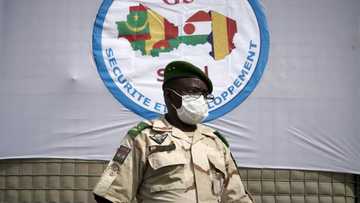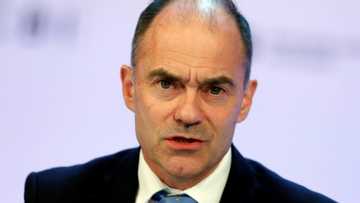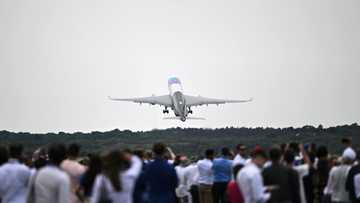UK's Tempest fighter project soars as European rival remains in limbo

Source: AFP
Britain's future combat fighter jet project Tempest soared this week past a key barrier at Farnborough Airshow 2022, but Europe's rival FCAS concept is stuck in limbo.
Defence spending has been a hot topic at this year's Farnborough, as nations bolster their armed forces following Russia's invasion of Ukraine.
Tempest was launched to great fanfare at the previous Farnborough event in 2018, as part of the UK's much-trumpeted combat air strategy.
Defence giant BAE Systems is a member of the Team Tempest alongside the UK government, Leonardo, European missile specialist MBDA and British engine maker Rolls-Royce.
Their objective is to develop by 2035 a twin-engined stealth aircraft that can be operated manned or unmanned, cannot be detected by radar, and will boast impressive features such as laser-directed weapons and a virtual cockpit.
Combat cloud

Source: AFP
PAY ATTENTION: Follow us on Instagram - get the most important news directly in your favourite app!
The consortium hope to produce a ground-breaking fighter jet capable of connecting via a "combat cloud" with its own drones and other military warfare assets.
Italy joined Team Tempest in 2019 and Sweden followed a year later.
Japan -- which is already assisting with engine and radar sensor technology -- is now set to jump on board.
"A flight combat demonstrator will fly within the next five years," Richard Berthon, director for future combat air at Britain's Ministry of Defence, said at Farnborough.
This preliminary demonstration version, or pre-prototype, is intended to test the proposed cutting-edge technology.
'Once-in-a-generation'
"It is a once-in-a-generation activity," said Herman Claesen, managing director for future combat air systems at BAE Systems.
"The last one was some 40 years ago for the (Eurofighter) Typhoon," he said at the airshow's Tempest event.
Eurofighter was developed by a European consortium comprising Britain, Germany, Italy and Spain.
It was initially conceived as a European fighter aircraft project in which France was involved.
However, Paris withdrew in 1985 and instead launched its Rafale fighter jet, produced by France's Dassault.
The French government began exploring with Britain a future unmanned combat jet project in 2014, but this cooperation was withdrawn after Brexit.
All the participants in these fighter projects are seeking to retain technological expertise in military aviation for decades to come.
For Tempest, London has so far earmarked £2.0 billion ($2.4 billion) and Rome has committed 2.0 billion euros ($2.0 billion) over a 15-year period.
Not far off
In stark contrast to Tempest, Europe's Future Combat Air System (FCAS) project, backed mostly by France and Germany, faced stagnation over the last year.

Source: AFP
Berlin, Paris and Madrid first launched FCAS back in summer 2017 -- and aim to develop their fighter jet by 2040.
The overall bill is expected to approach 100 billion euros, rendering it far too costly for a single country to finance.
Yet the FCAS programme has faced an exceedingly bumpy ride.
France, Germany and Spain negotiated for months over how to divide the complex workload that would bring the project forward.
They finally inked an agreement in August 2021 to inject a combined 3.6 billion euros into the project's initial stage, known as Phase 1B.
Team FCAS had aimed to launch their own flight demonstrator in 2025 which would then take to the skies two years later.
Since then, however, the airwaves have gone quiet for the proposed European hi-tech combat plane.
Contracts have not been signed because France's Dassault Aviation and main partner Airbus -- representing German and Spain -- have yet to reach agreement.
Dassault has accused Airbus of making unnecessary "extra demands" that threaten overall development and management of the project.

Read also
Global aviation's Farnborough airshow opens Monday amid a sweltering heatwave, with the sector aided by a modest recovery in air traffic and with Ukraine boosting defence budgets.
"We are simply asking that project management be respected... for the entire duration of the programme," said Dassault chief executive Eric Trappier on Wednesday.
FCAS 'will succeed'
Dassault and Airbus are at loggerheads over how to cooperate over the FCAS aircraft's central nervous system of flight controls -- and its stealth-related technologies.
"We have agreed with Dassault on sharing workload and responsibilities -- the difficulty is regarding how we cooperate," Airbus CEO Guillaume Faury told AFP on the sidelines of Farnborough this week.
"Negotiations are lengthy and difficult -- but they are important and I am convinced we will succeed.
"We have no choice -- it would make no sense to fail -- the project is too important."
Source: AFP




